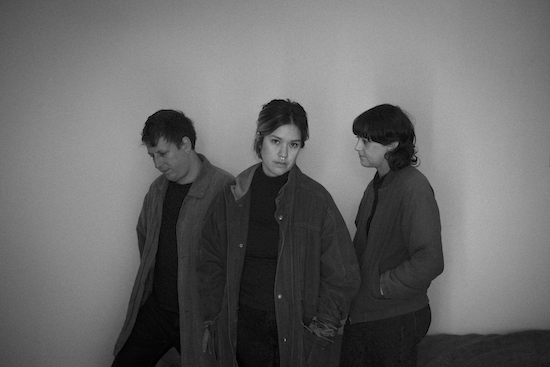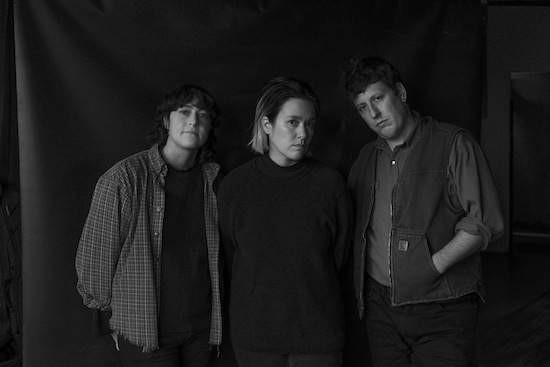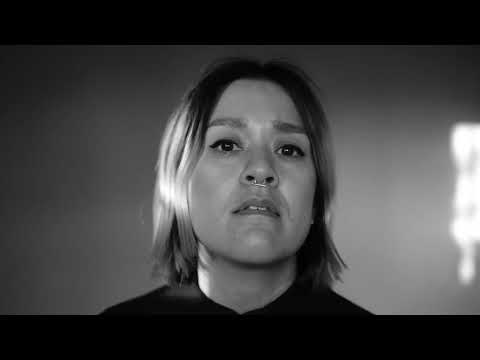Big Brave spent their first decade pushing further and further into the possibilities of heavy guitar music, of pummelling drums and thunderous guitars, of bass so vibrational it makes your hair hover atop your head. From their churning and raw debut Feral Verdure onwards, their sound thickened with each successive release. 2019’s A Gaze Among Them, their fourth album, shifted things into a higher plane with the recruitment of producer Seth Manchester, who helped refine a sound that was by now overwhelmingly caustic. Enlisting him as a regular fixture and de facto fourth member, with last year’s Nature Morte they had all but achieved perfection. It was an avalanche of an album, a gargantuan, towering titan of noise.
Big Brave’s Mathieu Ball and Robin Wattie don’t seem the types to refer to their own work in such grandiose terms. When tQ speaks on Zoom to two thirds of the Montreal trio – who had worked with a succession of drummers before their current percussionist Tasy Hudson joined in 2019 – they’re thoughtful and open-facing. Nevertheless, they say, there was a shared sense when in the studio for Nature Morte that the band were reaching a peak. “I thought, we’ve done what we can do with this,” says Ball.
“I was already thinking it, and then Mathieu vocalised it,” adds Wattie. “We were content with our exploration of loudness and heaviness. Nothing felt missing. Even Seth was saying, ‘I think we’re good here.’”
If you’ve peaked, however, what comes next? Can it be anything other than decline? Fortunately for Big Brave, a 2021 side project with Arkansas-born experimental metal duo and serial collaborators The Body had already showed them an alternative future route. By viewing the album they made together, None But Small Birds, as something that could stand apart from their individual discographies, both artists were able to take a breather from their respective quests for heaviness. Partly inspired by The Band, who also consisted of members from both Canada and Arkansas, Wattie researched traditional folk material to use as their starting point. Then, the musicians fleshed them out into performances that, though hardly minimalist, rely on delicacy and melody, Wattie’s vocals given room to stretch out and draw focus in a way they never had before. Here were two bands capable of producing eviscerating noise, restricting themselves of their greatest sonic weapons, and ultimately thriving.
Both Wattie and Ball are well-versed in folk music. Wattie taught herself to play guitar via bluegrass and country songs “because on the surface they don’t seem very complicated, even though they are,” and cites Gillian Welsh’s 1998 bluegrass record Hell Among The Yearlings as one of the most impactful she’s ever heard. “It blew my mind because it sounded like it should have been recorded ages ago.” Ball, meanwhile, grew up under the influence of a fiddle player uncle. “At gatherings there would always be music in the house, parties with 50 people, all of them playing music. It was a big part of my musical upbringing.” When Ball developed an interest in experimental music, a space in which he felt more naturally inclined as a player, he grew more distant from folk, “but the more I think about it, it was a big part of how I came up playing and understanding music and playing with others.”
“It reset our brains when it comes to how we think about writing music,” says Wattie of None But Small Birds. “I don’t know if we were stuck in a pattern [before that], but we had been really loyal to what Big Brave was supposed to sound like and were respecting that in our writing. We had just been fine tuning what we’d been trying to go for since almost the very beginning with regards to amplitude and texture, up until Nature Morte where were like, ‘OK, well there it is.’” Naturally, their first thought when following up the intensity of Nature Morte was to explore softness instead. They took inspiration from the Appalachian dulcimer playing of Jean Ritchie, music that’s “very pared down, strong but also gentle,” as Wattie puts it, as they laid out potential song structures – an artist Ball just happened to be listening to at the time. “We thought we were going to make a quiet record,” Wattie says.
And yet, that’s not quite what they came out the other side with. Quietness is present on their new LP A Chaos Of Flowers – the sparse ‘Chanson Pour Mon Ombre’ is the first time the band have employed acoustic guitar, and drums are more often scuttling brushes than big thumping stomps. As with their The Body collaboration, Wattie’s vocals are clear and deliberate. There’s still plenty of loudness too, however. The songs swim among big dark waves of rumbling, lurching guitar. “We still had a wall of amps, we still approached things in the studio similarly,” Wattie continues. “But whereas with previous albums everything was full force as much as possible, bringing everything back and then full force forward again, this time there was no feedback, no heavy drums.”
What’s ultimately changed is what Big Brave are doing with sonic extremes on A Chaos Of Flowers, rather than the existence of those extremes at all. “Loudness on the low-end can be soothing,” Ball points out. “This album is loud, it’s just not the abrasive, in your face kind of loud. It’s sound bath loud. Every track has this Moog synth playing bass, to give it this warmth and comfort.” On the flipside, the record’s most intense moments are often its quietest – the largely ambient ‘A Song For Marie Part III’, for instance, where a sparse melody sweeps wraithlike above deep bass, and which was actually recorded during the sessions for Nature Morte. It’s a record that twists the listener’s expectations from high and low volume. It’s notable, Ball says, “that some of the songs I thought were going to be louder ended up being the quieter ones.” A strange mixture of comfort and abrasion, each found in sonic climes in which they wouldn’t usually exist, A Chaos Of Flowers is a complex album, cathartic only occasionally, simultaneously sorrowful and soothing. It might be said to have a lot in common with the complexity of good poetry.
This makes sense, given that old poems by other authors were where Wattie sourced the majority of the album’s lyrics. “I find poetry quite moving,” they say. “Where just a few words can evoke a whole universe of thought and emotion.” This, again, was partly inspired by the process of using folk songs on their project with The Body. “One could arguably say that lyrics are always a form of poetry, especially traditional folk lyrics because of their cadence, but I feel like poetry is generally more emotive and less direct,’” they continue.

Exploring poetry was a longer and more intensive process than it was with folk music. “It’s a lot harder to gather information, and it’s not as easily accessible [as folk songs],” Wattie explains. Seeking poetry that she could relate to as a queer and mixed-race person, but finding that the majority of poems immediately available in the public domain were by white men, she was forced to dig deeper. “The kind of poets I relate to are quite niche these days, so I spent a lot more time researching. Like, weeks and weeks versus days in the studio for the record with The Body.” Eventually she emerged with several pieces that she chimed with. Although they’re all by women, they are diverse. Emily Dickinson, whose ‘I Felt A Funeral In My Brain’ is used for the opening of the album, is the best known, while there is also work from the early 20th century Japanese feminist Yosano Akiko, Renée Vivien who though British-born wrote primarily in French and was one of the most high-profile lesbians during the Belle Époque, the Harlem Renaissance writer and activist Esther Popel, and the Canadian poet Emily Pauline Johnson, also known by her Mohawk name Tekahionwake.
Beyond the poets being non-male, Wattie chose them, they explain, “because of a transcendental kind of experience that they share.” It was fascinating, they say, to observe the common ground that the poets expressed – despite coming from such different eras and backgrounds – the way the Dickinson and Vivien and Popel recount mental turmoil through the imagery of a walk while saddled with a big dark weight; or the sinister trees illuminated by moonlight that populate both Popel and Johnson’s poems. “These things that they’ve experienced are still being experienced today,” says Wattie. “By people who look like me and also people who don’t.”
As a marginalised person, she says, one of the most powerful things about such works, whether in folk music or poetry, is the way that they provide evidence that runs counter to mainstream historical narratives. “In high school, it was here’s the history book of North America, written by the people who won. I took that for truth, and what ends up happening is that it erases the existence of a whole people.” It was only in university, “when I was taking the history of North American First Nations, and another on the history of Inuit art, that I was like, this is the shit we should have been learning, but that’s an education you have to pay for.” Texts like these, they continue, “are about the experience of the everyday person versus the experience of person who was able to record things because they were in a position of power. Underneath [mainstream narratives] there’s a whole planet of entirely different experience.”
That experience on A Chaos Of Flowers is often one of struggle, and occasionally of outright despair. These are poems that explore the inner self, and yet it’s not hard, Wattie says, to draw relevance for the outer world too; the mental collapse that Dickinson recalls on ‘I Felt A Funeral’ can be quite easily equated with the societal collapse that we’re witnessing today. “We’re literally watching a genocide happen live,” Wattie says. “Pair that with just trying to survive day to day in Western culture. A mark of how well a culture is doing is ‘how happy are people?’. But we are not happy. We are all really depressed. And then it’s like, what do we do? Mathieu goes to every single protest. I’ve donated money when I can, I share as much information as possible. We try our best. But short of buying guns and raiding parliament, what can we actually do?”
Even on Yosano’s ‘Not Speaking Of The Way’, a poem about the bliss of being with one’s partner, and the way in which it can make one cast aside whatever’s happening outside, it’s a bliss that ultimately feels ephemeral within such context. “There are those moments of joy and tenderness that we can still experience,” Wattie points out, “and yet it’s fleeting.” It made them think about a video they saw of children in Gaza dancing, finding a slither of pleasure despite the horrors being inflicted on them. “It’s like they’re just trying to survive,” Wattie says. “I think that if internally you only live in sadness and depression and angst and anger, it’s hard to continue to function. As a species it’s how we’re able to survive, to compartmentalise, but then we do have to go back to face reality. It felt like having ‘Not Speaking Of The Ways’ nestled among the rest of the album mirrors that reality.”
This links back to the record’s instrumentation too, the increasingly nuanced deployment of loud and quiet, and the comfort amid the abrasion of their sound. There are pockets of stillness, and even transcendence, in both the music and the record’s lyrics, and yet these moments are also set in contrast with the darkness that crashes around outside them – both element finding increased power from the juxtaposition. Finding a way to make the music intertwine so tightly was “pretty challenging,” Wattie says, given that these were texts with their own poetic rhythms to be taken in mind. “I had to redo a lot of vocal takes.” She cites ‘Chanson Pour Mon Ombre’ as particularly difficult. “I wanted to respect that there’s a cadence there, that when you read it, it’s about walking and that sensation is there in the words. To translate that, especially in a different language, that was difficult.” When Wattie fell ill during their first recording session, it turned out to be a blessing in disguise. Recording so quickly after Nature Morte, the band weren’t as stressed as they might usually be about deadlines and took a few months off, “to just sit with everything, and listen back to what there was,” Wattie continues.
“We’ve never done that before,” adds Ball. “We’ve always just ploughed through recording sessions in 10 days. The time that we were allowed to spend with the music and go back and make these changes was quite great.” That said, when discounting the break in the middle the band actually spent just eight days in total with Manchester, such is the fluidity of their relationship at this stage. “That’s just the level of comfort we have with him,” Ball continues. With Wattie, too, he’s built up an immense level of trust, happy to let her follow her instincts when it comes to the “I don’t check out or anything, but if Robin has an idea or a concept for the lyrical part of the record, so far it’s always been a great idea,” he says.
On the one hand A Chaos Of Flowers represents a new start for Big Brave, a reorganising of their priorities after reaching the end of their journey to the peak of heavy music. To an extent they feel similarly about to the way they did about their debut album ten years ago. “With that record we were starting to get louder, and then with this one we’ve done all that, and we’re now learning how to play quieter, and go deep back into the folk music that we always liked,” says Ball. On the other, however, it’s impossible to divorce this new LP with what’s come before. Different as they are, both A Chaos Of Flowers and its predecessor Nature Morte feature flowers on their covers. Their shared natural imagery – evoking the climate crisis, another instance of an outer, large-scale collapse that has major repercussions for our inner worlds – implies a link between the colossal noise of the former record, and the more nuanced devastation of the latter. Or, as Wattie puts it, “Nature Morte is the cause, and A Chaos Of Flowers is the effect. North America will be on fire real soon.”
A Chaos Of Flowers is released on 19 April. Big Brave tour during May



